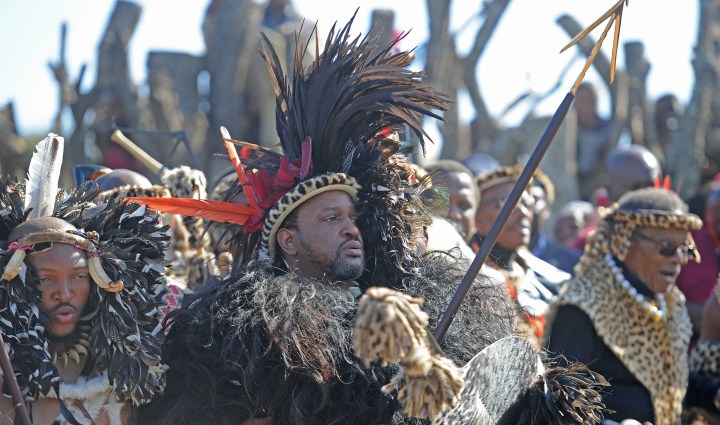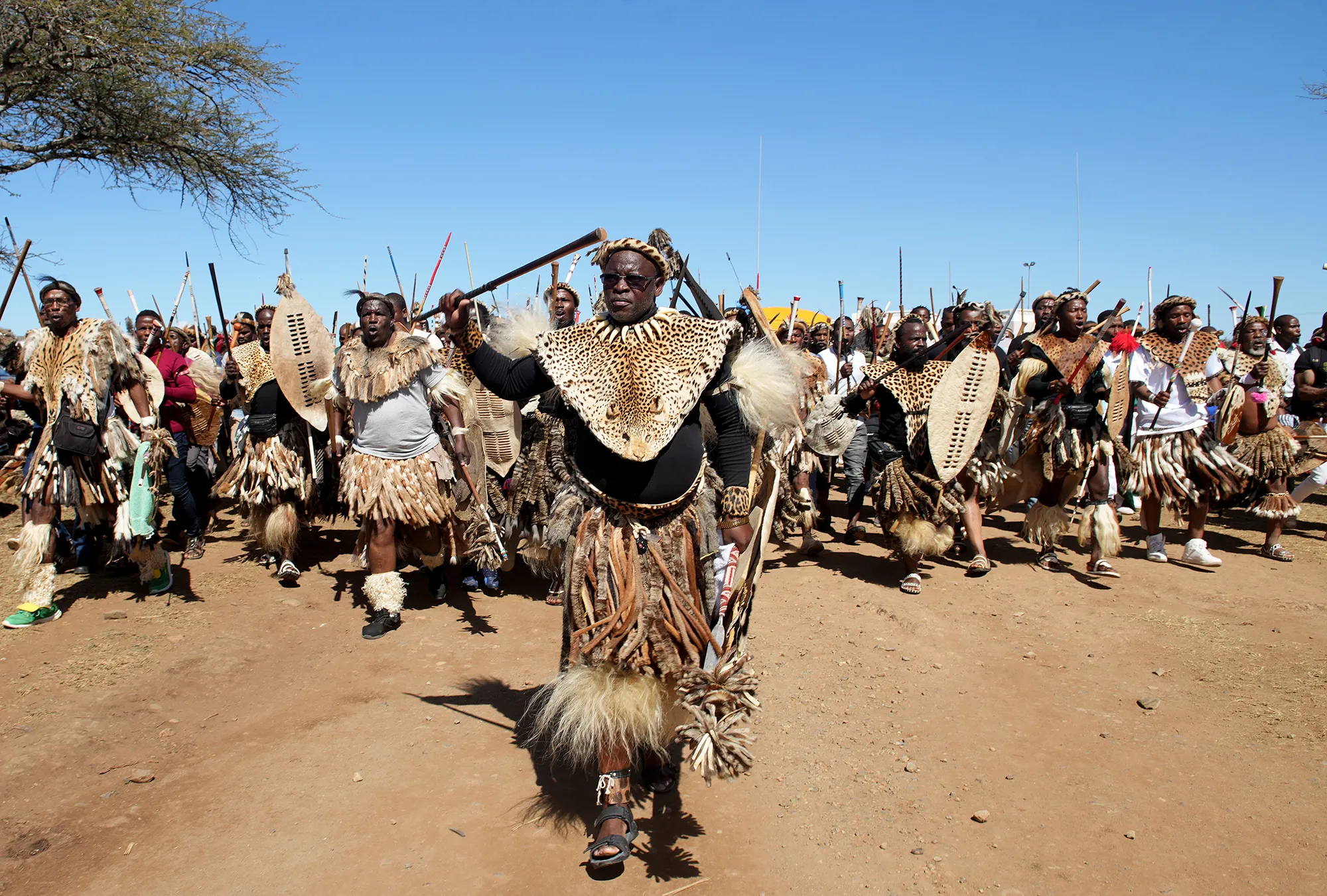RIGHT ROYAL ZULU OCCASION OP-ED
King Misuzulu gets Pretoria’s seal of approval this weekend — and then comes the long road of charting his legacy

When Zulu King Misuzulu receives his certificate of recognition from President Cyril Ramaphosa in Durban this weekend, he steps into a fiercely contested political terrain that ultimately will define his legacy in the preservation of monarchism in a constitutional democracy.
The function to be performed by President Cyril Ramaphosa in Durban this weekend, at which he gives newly crowned Zulu King Misuzulu a certificate of recognition from the government, may be dismissed by some as a merely ceremonial formality.
After all, in terms of Zulu traditions and customs, King Misuzulu has been on the throne since the conclusion of the “entering the kraal” ritual in Nongoma, the seat of the kingdom in the heart of Zululand, two months ago.
Ramaphosa will deliver Pretoria’s seal of approval — much as it happened more than 50 years ago when the apartheid government officiated at the coronation of a young prince, Goodwill Zwelithini, as king. The common thread for both occasions is that it is a public affirmation that it is the head of the Republic of South Africa that has the power to give legal recognition to any king within the country.
Politics and the king
Zwelithini navigated through a difficult period under the erstwhile KwaZulu government that was firmly under the control of Prince Mangosuthu Buthelezi’s Inkatha Freedom Party (IFP), then operating as a cultural liberation movement. The king’s ventures into the political terrain, through the establishment and covert funding of formations by Pretoria to challenge the IFP, all came to nothing.
It was the unbanning of the African National Congress and former president Nelson Mandela’s direct intervention that resulted in Zwelithini and some members of the Zulu royal family cutting ties with Buthelezi as traditional prime minister to the king and Zulu nation.

Zulu warriors at King Misuzulu KaZwelithini’s kraal ceremony in Kwakhangelamankengane on 20 August 2022 in Nongoma, South Africa. (Photo: Gallo Images / City Press / Tebogo Letsie)
However, after a tragic period of political violence that cost many lives in KwaZulu-Natal, relations between the ANC and the IFP thawed and the monarch rose above party politics and vigorously promoted unity and tolerance. The doors of his palaces were opened to all. Ahead of elections, political parties made a beeline to Nongoma to pay their respects to the king, and as is the custom, to bring izethulo in the form of gifts.
Indeed, as soon as Misuzulu emerged as the successor to the throne despite objections from other royal family members, political parties have been taking turns to make the long trip to Nongoma to salute the new king. Even Economic Freedom Fighters leader Julius Malema has urged his supporters to attend this weekend’s ceremony in great numbers.
As the government of the province, the ANC leadership is very close to Misuzulu. It funds the Royal Household Trust that manages the monarch’s properties and looks after the welfare of members of the royal family. Last year’s allocation from the provincial fiscus was R67.3-million.
A legacy to be defined
Now, the new king has to chart the long road towards what will define his legacy. Eagerly awaited is his choice for the critical traditional prime minister role, currently occupied by Buthelezi. He also served Zwelithini and King Cyprian, Misuzulu’s grandfather.
Despite remarkably good health and brains that remain as razor-sharp as ever, at 94 years of age Buthelezi cannot continue for long. Yet he remains the undoubted godfather of the project that is the Zulu constitutional monarchy. He crafted it from the ruins of the destruction of the original Zulu kingdom after colonial conquest.
But Misuzulu may find it difficult to let go of Buthelezi so soon after ascending the throne because of fear of being left exposed to his many detractors in the royal family who regard him as Buthelezi’s protégé imposed on them and the Zulu nation.
Visit Daily Maverick’s home page for more news, analysis and investigations
Despite his recognition by Ramaphosa as the legitimate successor, two of his brothers have challenged his elevation on the basis that they themselves should be king.
There are also many opportunists hovering around the new king to secure the kind of proximity that yields spin-offs of many kinds, such as business partnerships and endorsements.
As an elder in the royal family, besides his role as traditional prime minister, Buthelezi has had the responsibility of giving guidance to Misuzulu as he was being prepared for the mammoth task ahead amid a flurry of visitors and those seeking his attention to achieve their own ambitions.
Royal Council
Linked to the traditional prime minister role will be the appointment of members of the new king’s Royal Council. These are normally very senior members of the royal family who would be like his Cabinet in the government context and be steeped in matters of royalty and protocols. For instance, when Zwelithini sought to distance himself from Buthelezi as his traditional prime minister, he reconstituted his Royal Council and excluded Buthelezi.
Zwelithini’s own brothers’ names were submitted to Mandela as the core royal family. Interestingly, among them was Prince Mbonisi, who does not recognize Misuzulu as the new king and blames Buthelezi for imposing him.
The constitution of this Royal Council will therefore be an important decision if Misuzulu is to surround himself with people he can trust as he navigates his way through a range of challenges that become a way of life for a constitutional monarch in a democratic republic that has a Bill of Rights enshrined in law.
Ingonyama Trust
There is still no finality on the question of the Ingonyama Trust land that falls under the Zulu king and amakhosi. Misuzulu’s father had vowed to ensure that these tracts of tribal land, which constitute 30% of KwaZulu-Natal, remained under him even after apartheid was dismantled.
The responsibility now falls on the son to preserve that legacy. He will also find among burning issues the controversy around the passing of the Traditional Courts Bill by the National Assembly. The KwaZulu-Natal provincial government has urged Ramaphosa not to sign it into law, arguing that it will not pass constitutional muster.
These traditional courts are an integral part of the system of governance in many parts of rural KwaZulu-Natal, and many disputes have been resolved at that level for many decades. As the chief custodian of that traditional way of doing things, Misuzulu will be expected to provide wisdom to balance constitutional rights and African indigenous ways.
If there is one sentiment that all political parties in KwaZulu-Natal share about Zwelithini’s legacy, it is that he was a unifier who embraced them all equally. He emerged above the bloody political conflicts between the ANC and the IFP and pulled along conservative traditional leaders to co-exist with democratically elected local government leaders.
Misuzulu might need to prioritise peaceful co-existence with members of his own family, lest they succeed in convincing the courts that Ramaphosa is wrong to recognise him.
However, for the thousands who will converge at Moses Mabhida Stadium this weekend, it does not matter what the courts say, or for that matter whether a certificate of recognition has been handed over or not — the king is on the throne and he is Misuzulu.
What he makes of it is in his hands. DM














 Become an Insider
Become an Insider
Thirty years down the road and we just can’t leave this kind of BS where it belongs, in the past. I remember a lot of hype and enthusiasm about “DEMOCRACY DEMOCRACY DEMOCRACY” in the wake of 1992 and especially after the election of 1994, and yet for all the progressiveness of this mah-vellus Constitution we have managed somehow to hang on to the parts of the old regime’s legal framework that suit us, eh? Power utility monopoly, SABC licence fees, and other minor trivialities. Oh, and “traditional leaders” who don’t lead, aren’t elected, and are PAID A VERY HANDSOME SALARY by the government. Yah nice work if you can get it.
Such an anachronism in this day and age. We can’t even pretend some sort of economic benefit from tourists clamouring to see him and his retinue a la the British Royal Family (another anachronism quite frankly). Apart from anything else, via the Ingonyama Trust there is the perpetuation of a feudal system on the Zulu populace. They can only be granted land via a chief, that land cannot be mortgaged in any way so the capital value of that land can never be unlocked so perpetuating poverty.